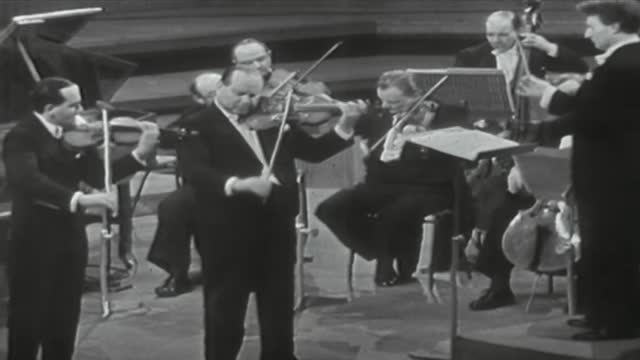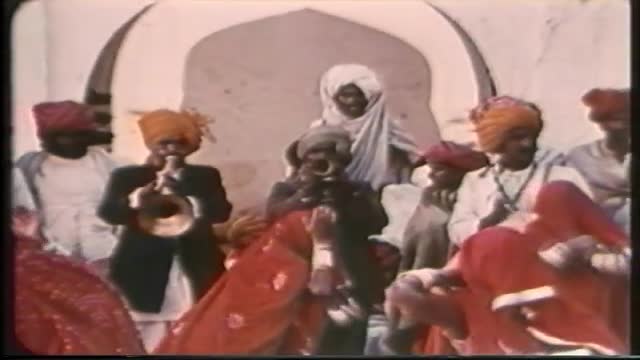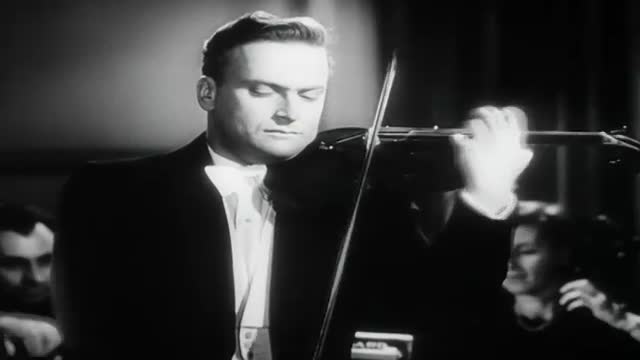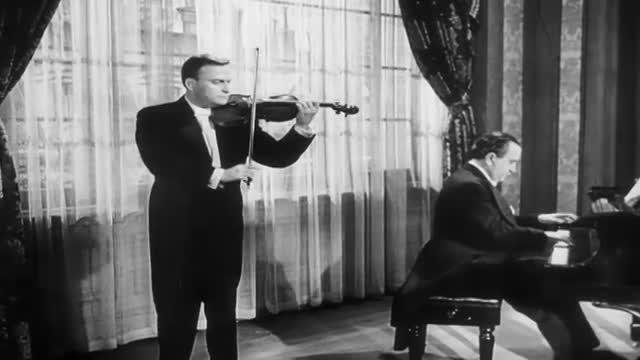Menuhin was born of a distinguished rabbinical dynasty. The name Yehudi (‘Jew’ in Hebrew) was decided when a prospective landlady told his parents that she didn’t take Jews: his mother vowed that her unborn baby would have a label proclaiming his race to the world.
Menuhin’s fame began with his first public performance aged eight and the commencement of his seventy-year recording career four years later. His playing was intuitively musical, eliciting praise from a New York Times critic in 1927: ‘It may seem ridiculous to say that he showed a mature conception of Beethoven’s Concerto, but that is the fact’, and Elgar’s comment to Delius: ‘The way that boy plays my concerto is amazing.’ Despite this adulation and all his training with Persinger, Enescu and Adolf Busch, all of whom promoted him eagerly, Menuhin felt himself to be underqualified as a violinist and suffered a crisis of confidence at nineteen that led to a withdrawal from engagements for over a year.
World War II brought more problems. Menuhin toured widely, playing over 500 concerts for Allied troops, and witnessed much devastation. At the end of the war he performed in displaced persons camps (sometimes with Benjamin Britten) and visited concentration camps soon after their liberation. When he returned to the US in 1948 critics noted that his playing had lost some of its beauty.
At this time Menuhin’s rôle in music began to take on a more political slant. He defended the German conductor Furtwängler against some Jewish criticism, spoke out against apartheid in South Africa and visited Israel despite threats against him. He toured India in aid of famine relief, meeting sitarist Ravi Shankar—with whom he made several recordings—and discovering yoga. After moving to the UK, Menuhin became involved in several festivals and embarked upon a conducting career. His interest in pedagogy prompted the founding of the Menuhin School and Competition and he became the President of UNESCO’s International Music Council for three successive terms until 1975. The 1970s saw successful collaborations with the jazz violinist Stéphane Grappelli; Menuhin also wrote two violin tutors and two volumes of memoirs.
For four decades from 1932 his sister Hephzibah was his favourite recital partner: ‘Ours was a special kind of collaboration, we needed few words. We played almost automatically, as if we were one person.’ Menuhin stopped playing in the early 1990s but continued conducting until his death on tour in Berlin in 1999.
Whilst the effects of old age can be heard in the case of many recording artists, they can be observed perhaps more with Menuhin than with any other player of his generation. By the 1950s nervous problems (only partially alleviated with yoga) spoilt his ability to sustain the bewitching and peculiarly emotive tone that characterises his earlier recordings. His intonation also waned in later life, but his famous pairing with Stéphane Grappelli and the recordings they made at Abbey Road in 1979 are largely free from such complaints and provide a fascinating testimony to Menuhin’s interest in popular and ethnic musical styles. Their performance of When the Red, Red Robin is a good example, opening with a lengthy violin solo played with great idiomatic understanding by Menuhin, before Grappelli’s unmistakable, small, incisive sound joins him in duet form, the two artists intertwining convincingly and yet fully maintaining their individualism. Here, Menuhin’s classical training results in a more sustained cantilena delivery.
From the beginning of his career one might select his 1929 recording of Bach’s Sonata BWV 1005, which scarcely hints at his tender age of thirteen! There is no concession to period style here, nor even a remembrance of Joachim’s austere and architectural style of Bach playing; rather, a sensuous tone with remarkable similarity to that of Menuhin’s teacher Enescu. From 1936 comes a fine recording of Enescu’s Sonata No. 3 with Hephzibah Menuhin, which amply demonstrates their closely-matched artistry. The famous 1932 recording of Elgar’s Violin Concerto under the composer’s baton cannot be omitted—a truly remarkable performance for one so young with Menuhin’s searching tone, garnished by his unmistakable use of portamento and quite a slow vibrato, showing great sympathy with this nostalgic work. As a matter of purely personal taste, I prefer Sammons’s more direct and purposeful rendering of the slow movement, which with Menuhin seems ruminative to excess. His first concerto recording—Bruch’s No. 1 with the LSO in 1931—has an unearthly quality and is more reflective than fiery, although the more popular 1951 recording with the Boston Symphony Orchestra (paired with Mendelssohn’s Concerto from 1952 in a famous LP issue) is even more so. Good as these 1950s recordings are they show a slight lack of direction and the almost palpable mental uncertainty that marred later recordings. Two of his stylistic hallmarks, the so-called ‘Menuhin slur’ (where a smoothly-slurred group of notes might have each one individually aspirated) and the curious descending portamento (in which he slides down from a note by a series of slightly ungainly chromatic jerks) are also apparent. Whilst it is perhaps stereotypical to celebrate his early work and denigrate much of his post-war output, Menuhin’s case proves that sometimes such clichés are deserved.
© Naxos Rights International Ltd. — David Patmore (A–Z of String Players, Naxos 8.558081-84).
| Title | |
| BACH, J.S.: Concerto for 2 Violins / MOZART, W.A.: Sinfonia concertante / BRAHMS, J.: Violin Concerto (D. and I. Oistrakh) | |

|
BACH, J.S.: Concerto for 2 Violins / MOZART, W.A.: Sinfonia concertante / BRAHMS, J.: Violin Concerto (D. and I. Oistrakh)
Composers:
Bach, Johann Sebastian -- Brahms, Johannes -- Mozart, Wolfgang Amadeus
Artists:
Davis, Colin -- English Chamber Orchestra -- Kondrashin, Kirill -- Menuhin, Yehudi -- Moscow Philharmonic Orchestra -- Oistrakh, David -- Oistrakh, Igor
Label/Producer: ICA Classics |
| INDIA: Raga (Documentary, 1992) | |

|
INDIA: Raga (Documentary, 1992)
Artist:
Menuhin, Yehudi
Label/Producer: Lyrichord World |
| MENUHIN PLAYS MENDELSSOHN | |

|
MENUHIN PLAYS MENDELSSOHN
Composers:
Bazzini, Antonio -- Brahms, Johannes -- Mendelssohn, Felix -- Sarasate, Pablo de
Artists:
Baller, Adolph -- Dorati, Antal -- Hollywood Symphony Orchestra -- Menuhin, Yehudi
Label/Producer: Ideale Audience |
| MENUHIN, Yehudi: Concert Magic | |

|
MENUHIN, Yehudi: Concert Magic
Composers:
Bach, Johann Sebastian -- Beethoven, Ludwig van -- Chopin, Fryderyk -- Gounod, Charles-Francois -- Liszt, Franz -- Locatelli, Pietro Antonio -- Mendelssohn, Felix -- Novacek, Ottokar -- Paganini, Nicolo -- Schubert, Franz -- Tchaikovsky, Pyotr Il'yich -- Wieniawski, Henryk
Artists:
Baller, Adolph -- Beal, Eula -- Campbell, Marguerite -- Dorati, Antal -- Gimpel, Jakob -- Hollywood Symphony Orchestra -- Menuhin, Yehudi
Label/Producer: EuroArts |
